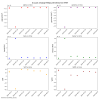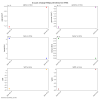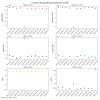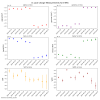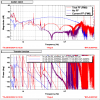We've been seeing the OMC trans camera spot shaking with some lower frequency motion (<100Hz) since the vent. It doesn't seem to be in any IFO signals that we've found so far though, but there's only been a few eyes on this issue (see Jenne's alog79748 for one quick investigation). Looking at the lock from overnight, it seems that the camera was much more stable than previous locks. Yesterday seemed to be some of the worst motion so far (5 day trend and 1 day trend). Trending the OMC QPDs and the OMC ASC I see no difference between the good and the shakey times. (attachment 3). I also would say that it doesn't seem to be affecting our range (attachment 4 and attachment 5). Also nothing seen in other ASC, LSC, or HAM6 CPSs, PEM acc. at HAM6 signals (the other attachments). Next steps would be to take a spectra and start trying to match the frequencies.



















